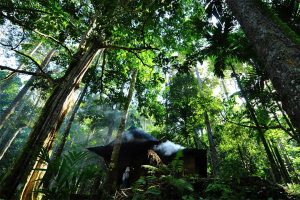By Malgorzata Buszko-Briggs, Senior Forestry Officer, FAO
The world’s countries, and many international organizations and forest stakeholders, will meet next week in New York, US, for the 19th session of the UN Forum on Forests (UNFF). This crucial meeting will seek to inject new ideas and further urgency into the quest to scale up forest-based solutions to global challenges.
Forests and trees are our allies in fighting climate change, conserving biodiversity, and transforming agrifood systems to make them more sustainable. Forest-based solutions are an essential ingredient for achieving SDGs 1 (no poverty), 2 (zero hunger), 13 (climate action), 15 (life on land), and many others.
UNFF 19 will review what is known as the International Arrangement on Forests and its contributions to implementation of the UN Strategic Plan for Forests 2017-2030 (UNSPF). This plan sets out six Global Forest Goals to be achieved by 2030. Progress has been made towards these goals, but there is still a long way to go.
For example, despite recent significant reductions in deforestation in some countries, the world is still far short of the target of increasing forest cover by 3% by 2030. Moreover, forests themselves are under pressure from climate change and other stressors, such as increasingly severe wildfires and pest attacks.
There is an urgent need to confront the threats to forests while scaling up solutions to match the magnitude of the challenges. This, in turn, will need innovative approaches and ever-stronger partnerships.
At UNFF 19, ministers and other high-level representatives responsible for forests are expected to adopt a ministerial declaration and what is called an “omnibus” resolution.
The Collaborative Partnership on Forests (CPF), which is part of the International Arrangement on Forests, is an inter-agency partnership of 16 international organizations, institutions, and secretariats working on substantial programmes and initiatives around forests. At UNFF 19, it will reaffirm its commitment to the CPF Joint Call to Action, issued last year, which is a clarion call for heightened commitment and concerted efforts to fortify forest-based solutions for achieving the SDGs and the Global Forest Goals by 2030.
Fostering responsible innovation will be central to the 27th session of FAO’s highest statutory body on forests, the Committee on Forestry (COFO), which will be held in July in conjunction with the ninth World Forest Week.
COFO sessions, which are held every two years, bring together heads of forest services and other senior officials from governments around the world to identify emerging policy and technical issues and seek solutions.
COFO 27 will focus on accelerating the contributions of forests to the SDGs through innovation, led by debate on FAO’s flagship report, ‘The State of the World’s Forests’ (to be launched during the session), which analyzes forest sector innovations towards a more sustainable future.
Innovations have the potential to scale up forest conservation, restoration, and sustainable use as solutions to global challenges. They are already leading to fast-moving changes in forestry – ranging from technological innovations in data for improving forest monitoring, assessment, reporting, and management, through new means for organizing smallholders and enabling them to scale up their economic power, to astonishing advances in wood use.
There is no shortage of global challenges that forests and trees can help address, and no shortage of threats they themselves face. Fortunately, we can take steps now towards a better future. To accelerate the contributions of forests to the SDGs, the Global Forest Goals, and other commitments, we need robust policy debate that leads to the deployment of more innovative solutions on the ground. Complementing each other, UNFF 19 and COFO 27 will play important roles towards this end.


